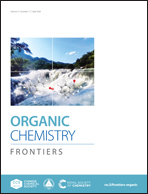A convergent paired electrochemical strategy for decarboxylative C(sp2)–C(sp3) bond formation†
Abstract
In this report, we describe a convergent paired electrochemical decarboxylative C(sp2)–C(sp3) cross-coupling reaction that employs readily available alkyl carboxylic acids and C(sp2)–iodides as direct coupling partners. This easy-to-operate electrochemical process occurs under mild conditions, uses inexpensive materials and reagents, requires no prefunctionalization of the native acids, and operates broadly across diverse aryl, heteroaryl, and alkenyl iodides, thereby providing powerful and flexible access to the construction of C(sp2)–C(sp3) bonds. The utility and practicality of this convergent paired electrolysis is demonstrated in the syntheses of high-value and synthetically challenging unnatural amino acids and terpenoid natural products. Extensive mechanistic studies shed light on the anodic PPh3/NaI-mediated generation of N-hydroxyphthalimide esters and the cathodic reductive cross-coupling processes facilitated by NiI species.

- This article is part of the themed collection: Organic Chemistry Frontiers Emerging Investigator Series 2024–2025


 Please wait while we load your content...
Please wait while we load your content...